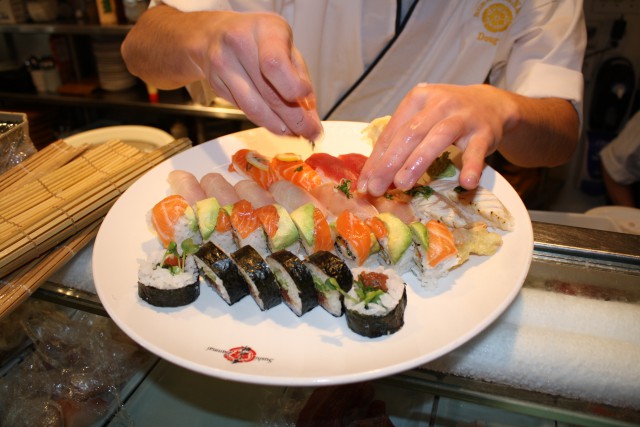
Women’s hands are too warm, the argument goes, to handle the ingredients. They’d damage the raw fish. The perfume or makeup or lotion on women’s hands would ruin the salmon and tuna.
Of course, these are animals that live in some of the filthiest ecosystems this side of the Death Star’s trash compactor.
Yuki Sanda, sushi chef at Boulder’s Sushi Zanmai, has heard every excuse in the book — both in her native Japan and in the U.S., where she relocated in 1995. And the arguments still hang around, Sanda says, even today.
Sanda is part of a growing group of women being given the opportunity to work as sushi chefs, a position typically — almost entirely — held by men until recently. And she says that she enjoys the work, but it comes with a certain amount of resistance among traditionalists in the sushi world.
“People think we have very warm hands [and] it’s not good for the raw fish. That was the main reason I heard,” she says. “And many women put on makeup or [get a] manicure, so that’s not good for the very delicate cuisine.” (By the way, there’s scientific evidence that women’s hands are a little bit colder on average.)
These aren’t some long-past prejudices, either, especially in Japan, where women are still shut out of the position.
“It’s very rare in Japan,” Sanda says. “I haven’t seen any. I heard [of ] a few people, but I haven’t seen.”
She notes that there’s a markedly different mindset in the U.S. than in Japan.
“It’s more open-minded, I think, here. In Japan, a little bit more conservative, I think,” she says. “Especially my boss is very open-minded. He’s Japanese, he’s from the southern part of Japan.”
Her boss, Naoto Kanda, shocked Sanda when she started at Zanmai in 1995. She’d just arrived from Japan, having worked for years as a kitchen chef for her parents at a restaurant in Osaka. She says she was all set to take the same job at Zanmai, but Kanda had other plans.
“I arrived as a kitchen chef here,” she says. “And my boss gave me the opportunity to be [a sushi chef], so I was kind of shocked. When he asked me, ‘Why don’t you do sushi chef?’ I refused, because I [had] no idea woman sushi chef existed.”
Kanda — who had employed several women before Sanda — won out, and Sanda began working as a sushi chef soon after.
“My mother was so surprised when I started,” she says.m“It was very funny. She was wondering, how I can do it? Can I do it? And also her restaurant’s customers, they’re surprised, my friends in Osaka — everybody is surprised.”
A healthy dose of inequality between the genders keeps women out of sushi kitchens — inequality Sanda says she hopes is in the past.
“In Japan, right now, it’s pretty much equal,” she says.
“But a long time ago, the woman was very low-estimated, underestimated,” Sanda says. “So that’s one of the reasons, I think.”
But she says there’s evidence that the past isn’t too far gone. Even at Zanmai she’s had customers unhappy to have their sushi made by a woman.
“A few people, they’re surprised. Especially Japanese people, when they come to eat and they sit in front of me, they say, ‘Are you gonna cook for me?’ It’s a — ” Sanda says, then pauses. “I was very disappointed for somebody to say that to me.”
A block away, life isn’t much different for Hapa on Pearl sushi chef Brenda Wong, a five-year veteran who says she’s seen many of the same issues Sanda describes.
“People make comments,” Wong, an American who started at Hapa in 2006, says. “It’s like, is this 2012? Can’t women do anything they want?” Wong, like Sanda, says that customers usually simply express surprise that a woman is working behind the sushi bar.
“I get comments all the time: ‘Oh, cool, you’re a chick,’” she says. “But I’ve worked with a lot of female sushi chefs. When people say they’ve never seen one before, I want to say, ‘Have you ever been out before?’” Five years ago, Wong got a start similar to the one Sanda got back in the ’90s: Management just made the call.
“I didn’t [want to]. I worked front-of-house and they put a knife in my hand and told me to start slicing. It was never anything I sought out,” she says, although she says she does enjoy the work.
Wong says she isn’t sure why, but she thinks there are more female sushi chefs in Boulder per capita than in larger cities like San Francisco and Los Angeles.
“Here, it’s a lot more acceptable,” she says. But she has faced some of the same old sexism. “There’s looks you get from customers,” she says. “Like when it’s me and four male chefs, some people migrate toward the males. But rarely does that happen.”
Wong even has a response ready for anybody who tells her women’s hands are too warm for raw fish: She says, with a laugh, “Women are way more cold-blooded than men.”
Respond: [email protected]














